Mr. Pollievre, Tear Down These Walls.
A Bold Request For Canada To Address Twelve Areas. But Only If Pollievre Has The Courage To Face The Winds And Storms Of Name Calling And Opposition.
If you believe in the importance of free speech, subscribe to support uncensored, fearless writing—the more people who pay, the more time I can devote to this. Free speech matters. I am a university professor suspended because of a free speech issue, so I am not speaking from the bleachers. The button below takes you to that story if you like.
Please subscribe and get at least three pieces /essays per week with open comments. It’s $5 per month and less than $USD 4. I know everyone says hey, it’s just a cup of coffee (with me, not per day but just one per month), but if you’re like me, you go, “Hey, I only want so many cups of coffee!” I get it. I don’t subscribe to many here because I can’t afford it.
But I only ask that when you choose your coffee, please choose mine. Cheers.
_______________________________________________
My father once told me politicians campaign from the outer fringes but govern from the centre. This could be prudent; it could be because they are unable to overcome the inertia created by the bureaucracy, it could be because of cowardice, or it could be that once in power, they are faced with the reality of criticism and run away because they are more concerns about polling and power than meaningful change.
The politicians are also affected by the hubris that builds with power. It is the one that is as old as mankind and says, “No, I know better than everyone else, I will tell them what they need, I am smarter than the collective will of the masses, I am smarter than the market. “
The middle ground may draw ire, but it will not draw the most extreme ire. The most ire is for those with the balls to implement real, meaningful change and not tinker from the edges. We need to forget the three bears and their porridge-picking propensities.
Take the hot porridge.
We wonder why there seem to be solutions to national problems; other countries have succeeded before us, and even within Canada, there is no end to capable advice.
Why do we know what to do, but things remain the same?
The answer is vested interests, those silent and secret forces that want things the way they are. A “vested interest” refers to a personal stake or involvement in a particular situation, outcome, or decision, usually because it could directly affect one’s own welfare, benefits, or financial interests. When someone has a vested interest, they are likely to support or oppose certain actions, policies, or decisions due to the personal advantages they stand to gain or lose.
WHY?
Because the present system works well for many, it might be the hospital administrator who makes $450K and does little, the company offering services that do not want competition from other provinces, the telecoms that are afraid of foreign competition, the politicians who know that the spending billions of future taxpayer dollars today will get votes today - though create damage in the future - well they might not even be around. Those voters will be so disengaged they won’t realize why it happens.
And these vested interests, they have connections, they have money.
For example, there are certain students who, if I fail in my class, will complain; if they are “racialized”, they might say that racism is the reason; if they are lazy, they will never say ‘I am lazy’; no they will find something, some announcement that wasn’t clear, some reason that offers no personal culpability and they will frame the gross injustice that, they, an “A Student” did not get what they deserved in a way that never betrays their vested interest.
They will always do so in a way that makes them look innocent and oppressed. And so it is with adults and politicians and vested interests. And it has nothing to do with race or skin colour.
My point is that vested interests will never say, “I don’t want this because although its continued implementation hurts most people, it helps me so that everyone can go to hell.” They will hire consultants and advertising agencies, drape themselves in the flag, and when pressed, they will get dirty and mean.
Organizations and people are never meaner and more vicious than when their self-interest is threatened.
But our government should push for the greatest good for the greatest number, with carve-outs for those genuinely hurt unfairly due to no actions of their own. That is frequently assumed, but it is very rare if you pull back the layers of rhetoric and lies.
Humans look out for themselves.
The art of being a Canadian politician is to make the public think you are looking out for them while looking out for yourself.
Politicians know the above. They fear powerful lobbies that protect the status quo. They know that campaigning on change but governing based on timid acquiescence is often a time-tested method for retaining power.
True boldness is a very rare political trait.
Imagine a politician who speaks plainly and says we will be changing this because it is for the good. Entrenched interests will buy advertising time; they usually have the most money, not like us plebs; they will tweet, post, and demonize agents of change, but we must have a leader who dares to press on in the face of such a storm of abuse.
I cannot remember one in my time.
But let us imagine one in Canada, Mr. Pollievre.
Let us imagine a bold, clear leader who pushed forward the following ideas, hired competent managers and planners to work through the intricacies, but, more importantly, had the balls and courage to face the storms of criticism with a conviction that the storm would pass and that the public would be won over in the end.
Assuming that Mr Pollieve gets a majority when Canada is finally rid of the curse that is the Trudeau Liberals, I say (some of these ideas would involve provincial cooperation, but the federal government can still find a willing provincial partner and set an example for Canada) :
MR. POLLIEVE, TEAR DOWN THESE WALLS. BE A LEADER THAT WILL STAND ON DECK AND NAVIGATE THROUGH THE STORMS.
(Note: You will be called a fascist, nazi, heartless, monster, etc., but keep your chin up; corporations will throw advertising dollars to take you down, and lobbyists will squeal and whine but do not stop.)
1. Follow Ireland and restore prosperity.
We are number 19 in the world in purchasing power parity measure prosperity today; 20 years ago, we were number 9.
My ancestors left Ireland for better opportunities in Canada. Now, the Celtic Tiger has roared past Canada. Canada could benefit from adopting tax policies similar to Ireland’s, which focuses on competitive corporate tax rates and a business-friendly environment to attract global investment. Ireland’s 12.5% corporate tax rate has drawn multinational corporations, creating jobs and fostering economic growth. Meanwhile, Canada’s high tax rates and regulatory burdens have discouraged investment, stifling innovation and economic dynamism. As a result, Ireland’s GDP per capita has surpassed Canada’s, reflecting higher prosperity and growth. By lowering corporate taxes, simplifying regulations, and encouraging entrepreneurship, Canada could stimulate its economy, attract foreign businesses, and reinvigorate growth, following Ireland’s proven path to increased national wealth. Ireland has focused on raising consumption taxes (visible) and lowering income taxes.
What happens to incentives when for every $10 you earn you get only $4.50? That is Newfoundland and Ontario gives you only $4.80 at the top marginal rate.
Canada could benefit from adopting tax policies similar to Ireland’s, which focuses on competitive corporate tax rates and a business-friendly environment to attract global investment. Ireland’s 12.5% corporate tax rate has drawn multinational corporations, creating jobs and fostering economic growth. Their domestic companies are also very efficient and have high productivity per worker.
Meanwhile, Canada’s high tax rates and regulatory burdens have discouraged investment, stifling innovation and economic dynamism. As a result, Ireland’s GDP per capita has surpassed Canada’s, reflecting higher prosperity and growth. By lowering corporate taxes, simplifying regulations, and encouraging entrepreneurship, Canada could stimulate its economy, attract foreign businesses, and reinvigorate growth, following Ireland’s proven path to increased national wealth.
2. Drop Interprovincial Trade Barriers.
This would add 4% to national wealth. That is huge. It is absurd that we still have such barriers in our own country.
Make it happen. Eliminating interprovincial trade barriers could increase Canada’s national GDP by an estimated 4%, according to multiple economic studies. These barriers, such as differing regulations, licensing requirements, and transportation restrictions, prevent goods, services, and labour from moving freely across provinces, acting as internal tariffs. By removing these restrictions, Canada would enable businesses to expand their markets, increase productivity, and reduce costs associated with compliance. This enhanced efficiency and broader market access would drive economic growth and investment, creating a more unified and prosperous national economy, spreading benefits across all provinces and boosting Canada’s overall wealth and competitiveness.
3. Fix Healthcare - Model the best.
Kill the Canadian Health Act if necessary.
Health care is for health, not for making ideologues happy.
Canada could improve its healthcare by having one province fully adopt the best global model for a single-payer system, such as Norway or Sweden. These countries demonstrate that single-payer systems can be efficient, with short wait times and high-quality outcomes, by combining public funding with effective management and innovative practices.
A Canadian province that adopts this model could introduce advanced technologies, integrated care pathways, and private-public collaborations within a single-payer framework. This would allow the province to retain universal coverage while reducing inefficiencies, long wait times, and bureaucratic delays. Once the province successfully demonstrates superior outcomes, other provinces could follow suit, building momentum for a nationwide transformation. This approach would avoid federal overreach and respect provincial autonomy, all while enhancing Canada’s healthcare standards.
A provincial success story would make the case that Canada’s healthcare doesn’t have to remain a costly, underperforming system and could instead become a model for quality care globally.
4. No Pork. No Subsidies. End it. Stop.
Canada could adopt a radical “no pork” policy by eliminating all corporate subsidies, including those in protected industries like dairy, oil, German battery companies and telecommunications.
Currently, subsidies distort the market by favouring certain businesses, often leading to inefficiency, dependency, and unfair advantages that hurt smaller players and prevent innovation. They distort capital and labour movements.
A “no pork” approach would ensure no company receives preferential treatment, creating a level playing field where businesses succeed based on merit, efficiency, and value.
In place of subsidies, Canada could reduce corporate tax rates across the board, making the business environment more competitive and attractive for all industries. Lower corporate taxes would encourage investment, job creation, and productivity growth, as companies could reinvest saved taxes into their operations, innovations, or workforce. This streamlined approach would reduce government spending on subsidies, freeing up funds for essential services or tax relief for citizens while encouraging companies to compete fairly.
Let’s face it. Subsides and “investment” are foolish gambles of future taxpayer’s money for todays’s votes. They know that $42B to German battery/auto companies will be forgotten and that the wastage will slip into the dark pond of government waste that looks nice on the surface but is full or rust and decay under its tranquil surface.
Such a shift would foster a more dynamic, self-reliant economy where resources are allocated efficiently based on market demand rather than government preferences. This new economic landscape would make Canada more competitive globally, boosting prosperity for Canadian businesses and consumers without the distortions caused by subsidies.
5. Create intergenerational tax fairness.
Young people are getting screwed, not only in housing. Stop it with the senior hot chocolate discounts. They are the richest segment.
Canada can eliminate deficits and promote intergenerational fairness by committing to disciplined fiscal policies that avoid saddling future generations with debt from current spending. This requires curbing unnecessary expenditures and focusing on high-impact infrastructure, education, and healthcare investments that provide lasting benefits. Reforms should include a cap on government spending growth tied to economic growth rates, ensuring expenditures don’t outpace revenues. Additionally, implementing sunset clauses on non-essential programs and subsidies can prevent indefinite spending that doesn’t deliver ongoing value.
The problem is that greedy selfish people my age tend to vote in high numbers and usually in their interests. Do we hate our children?
Tax reform is also crucial: simplifying the tax code and reducing loopholes would increase efficiency and fairness, broadening the tax base without raising rates. Finally, establishing a sovereign wealth fund from resource revenues—modelled on Norway’s approach—could help build financial reserves for future generations. By adopting these practices, Canada could eliminate deficits sustainably, ensuring today’s spending doesn’t compromise tomorrow’s prosperity and creating a legacy of financial responsibility and economic resilience.
The Conservatives must adopt a policy whereby when MPs pass a yearly budget, if they raise our debt, their wages drop the same amount as the deficit increases. No escape. Make it personal.
They should also have to put on everyone’s tax return each year how much taxes paid toward interest on debt and how much on a per-person taxpaying basis that same person would owe if the total provincial and federal debt were divided and paid by all the taxpayers. The person should have to sign that they have read it on their tax form.
6. End the attack on our natural advantages.
Canada could harness its natural strengths in oil, gas, mining, and agriculture by reducing restrictive regulations and embracing these industries as essential economic growth and job creation drivers. The days when we are ashamed of our natural wealth and work against our interests need to end.
Of course, the politicians who push these self-destructive policies never have any skin in the game and are personally unaffected.
These sectors hold vast global market potential and align with Canada’s abundant natural resources, advanced technology, and skilled workforce. Simplified, clear regulations would ensure environmental responsibility while enabling efficient development and international competitiveness.
By celebrating and investing in these industries, Canada could increase exports, bolster national prosperity, and reduce dependency on foreign energy. Embracing these strengths would enhance economic resilience and signal pride in Canada’s resource-based economic contributions.
Canada produces 1.5% of the world’s CO2; our climate change efforts are virtue signalling; they can produce no tangible benefits until the world is united. China, India, and major emitters are not on board. We are being played for fools. We are not setting an example - except as fools.
7. Allow real foreign competition.
Nearly 46% of Canadian industries are shielded from foreign competition through tariffs, quotas, and regulations that protect domestic businesses but limit market efficiency.
Sectors like telecommunications, dairy, and banking operate with little international competition, allowing companies to maintain higher prices and reduce innovation. Removing these protections would open Canadian markets, exposing domestic industries to global competition, often driving lower costs, higher productivity, and improved consumer quality.
Increased foreign competition would spur Canadian industries to innovate and become more efficient, enhancing consumer choice and affordability while fostering overall economic growth, thus boosting Canada’s prosperity and global competitiveness.
8. Restore sanity to immigration.
Canada’s immigration plan should prioritize skilled immigrants who contribute meaningfully to the economy and society. Right now the federal government knows that todays immigrants (who are allowed for God knows why to vote on who becomes a party leader) will become future Liberal votes when they become citizens. That is why Trudeau has gone mad, it’s always, always votes that drive the Liberals.
This plan would set hard caps on overall immigration numbers based on economic needs, infrastructure capacity, and employment demand. Immigrants would be selected through a rigorous, skills-based points system, favouring applicants with critical skills in sectors experiencing labour shortages, such as healthcare, technology, and engineering. Language proficiency and educational attainment would also be key criteria, ensuring immigrants can integrate and thrive.
To reinforce social cohesion, all applicants, aside from those in Canada’s refugee obligations, would undergo a cultural orientation and values assessment to affirm their alignment with Canadian principles such as democracy, equality, and tolerance. Newcomers would also complete integration programs focusing on language skills, employment preparation, and civic engagement to promote assimilation while respecting individual backgrounds. This balanced approach would ensure Canada’s immigration policy benefits the economy, strengthens social unity, and maintains core values, fostering a cohesive and prosperous society for generations.
Do you know who excess immigration hurts the most? Immigrants. I teach immigrants, 99% of my students. I see their anxiety and pain, and see how they have been lied to. We should have no ill will to our immigrants, it is our govenment that has lied to them and abused them.
9. Simplify the income tax code.
A simplified income tax code would help Canada prosper by reducing the costs and complexity of tax compliance for individuals and businesses.
With fewer deductions, credits, and intricate rules, Canadians could file taxes more easily, saving time and money that would otherwise be spent on accounting fees. Businesses could allocate more resources to growth, innovation, and job creation rather than tax planning. Additionally, streamlined tax administration would reduce government costs, allowing for more efficient resource allocation. Improved compliance and lower tax burdens would boost productivity and investment, ultimately driving economic growth and enhancing prosperity for all Canadians.
The accountants will protest, and their reasons will not be “but I won’t make money anymore” - they will frame it around some altruistic, pseudo-compassionate reason that will be a lie. They have lots of money for good PR hacks to spin in for them.
10. Restore sanity to the scope and volume of federal public hiring.
Canada should implement a strict hiring and wage freeze across federal government positions to curb unsustainable spending and promote fiscal responsibility. Federal hiring was even (and has grown since) up 40% since Trudeau came into power. More work? Don’t computers and tech make workers more efficient? And they are better paid, less likely to be fired, and have better benefits.
Is it just that a federal worker is always assured of a Liberal vote?
Alongside this freeze, establishing an independent third-party agency tasked with auditing federal agencies would identify redundancies, streamline operations, and cut unnecessary expenses. But don’t hire consultants to figure out how to hire consultants. This agency would review programs, staffing, and expenditures to ensure resources are used effectively, eliminating wasteful practices that burden taxpayers. Such measures would instil accountability and foster a culture of efficiency within the public sector, enabling the government to refocus resources on essential services and long-term economic health without raising taxes or increasing debt.
We need a fully open and easy to use government portal that lets every citizen see how every dollar is spent. A two-click inquiry. Every freaking last dime. All salaries. And there should be a timeline on freedom of information inquiries with strict rules about redaction. And advertise the hell out of it.
I would love to know how much money the Vice Provost of my University has spent in her war against me (and her past war against the Business Department Head in which she abused and tormented him and then finally went full suspension and sacked him.)
How would students feel when their find out their Vice Provost is shown to be so consumed with insecurity, politics, prejudice, vanity and vitriol that she will spend a million dollars of tax dollars on purging the institution of those who poke at her vanities? How much would that translate into lowered tuititions? How many full scholarships for poor students could that have got?
One would think that the Board of both the University of Guelph and Humber College would care but they probably care more about the catering at their infrequent meeting, not rocking the boat, and what the hell, what’s a million or two dollars, its’ not coming out of their wallets!
TRANSPARENCY
(The AI will not remove headdresses; it’s annoying)
11. Do something radical for the Indigenous.
We need real action, not land acknowledgements - not art to give the woke something to peacock about on their Instagram. We need a radical, transformative program for Indigenous empowerment in Canada that would start by offering Indigenous youth access to top-tier secondary education, regardless of location. By establishing specialized high schools or partnerships with leading schools, Indigenous students who meet eligibility criteria and academic standards would receive an outstanding education grounded in academic excellence and cultural knowledge.
This foundation would prepare students to succeed in competitive post-secondary programs, for which they’d receive full funding (including housing, food, books, misc.) as long as they maintain strong academic performance, without affirmative action - but by merit and preparedness.
They would compete on a level plain field. Affirmative action starts too late and creates resentment, and more racism.
This program would also extend economic empowerment through recognizing property rights for Indigenous communities, allowing them to use reserve lands as collateral. With this leverage, Indigenous communities could obtain financing to build or buy businesses, invest in infrastructure, and engage in sustainable development initiatives. These rights would empower Indigenous communities to create wealth, develop autonomy, and build lasting prosperity without compromising their cultural traditions and ancient ways. By providing high-quality education and economic tools, this program would lay the groundwork for Indigenous peoples to flourish in modern society while preserving their heritage, creating a future where opportunities are boundless, not limited by historical barriers or imposed dependency. We should be ashamed that we have youths sniffing gasoline; the degree of hopelessness and pain that drove them there is earthshaking. We need to restore hope radically.
12. Work with provinces to reform education.
Opening Canada’s public education system, both secondary and post-secondary, to charter schools could drive higher standards through competition and accountability. Charter schools offer alternative teaching methods and specialized programs, providing families with diverse choices and fostering innovation.
And parents could divert their property tax dollars to these schools.
Schools would be incentivised to improve if funding were tied to measurable outcomes—like graduation rates, standardized test scores, and post-graduation success. One province could pilot this model, setting up a framework that allows for charter schools while holding them accountable to public standards. Success in this province could showcase increased student achievement and inspire others to adopt similar policies, enhancing education nationwide.
University and college loan repayment expectations would be based on how well the average graduate does. If a university charges $80k for a film appreciation master’s and no graduates ever make enough to pay back their loans because the greedy university created a useless grad degree or certificate, let the institution eat the student loan costs.
Make universities and colleges have some skin in he student loan game.
Canada could establish rigorous educational standards and outcome-based evaluations to ensure that universities and colleges focus on critical thinking and meaningful skills. Institutions must demonstrate that their programs develop students’ analytical, problem-solving, and practical skills relevant to today’s workforce.
This could be enforced through accreditation audits and post-graduation assessments, requiring schools to publicly report job placement rates, graduate competency scores, and employer feedback. It’s hard to do; only successful ones often report back. Academic institutions know it but fudge the figures anyway.
Additionally, funding incentives could be tied to these outcomes; schools that consistently fail to meet benchmarks would see reductions in government grants or eligibility for student loans. Universities could also be required to update their curriculum based on market needs and integrate interdisciplinary courses that emphasize real-world applications of knowledge. This approach would prevent credential inflation by holding universities accountable, promoting a shift from tuition-driven enrollment to skill-oriented education, and ensuring graduates leave with valuable, applicable skills.
CONCLUSION
Twelve bold ideas.
I think the government underestimates the willingness of the Canadian people to accept bold plans.
We must start acting in the people's interests, stop placating squeaky wheels, and start instituting plain language plans for change. These smart, measurable (with accountability) ideas can restore the prosperity of this great nation.
A rising tide will float all boats and help the poor, the rich and the middle class. It may not help the politicians and not please the vested interests.
But before we listen to any naysayers, we should adopt a simple rule - what would happen to this person’s income and benefits if these measures were adopted?
If they are paid advocates or researchers and if the opposite of their position became accepted wisdom would would it mean they would lose income and prestige? If so, then they are bought and paid for and have little real credibility; they should not be lecturing common Canadians.
Please share if you think others should read this. There is no paywall on this article.
Thanks for reading.
Please subscribe and get at least three pieces /essays per week with open comments. It’s $5 per month and less than $USD 4. I know everyone says hey, it’s just a cup of coffee (with me, not per day but just one per month), but if you’re like me, you go, “Hey, I only want so many cups of coffee!” I get it. I don’t subscribe to many here because I can’t afford it.
But I only ask that when you choose your coffee, please choose mine. Cheers.
_______________________________________________





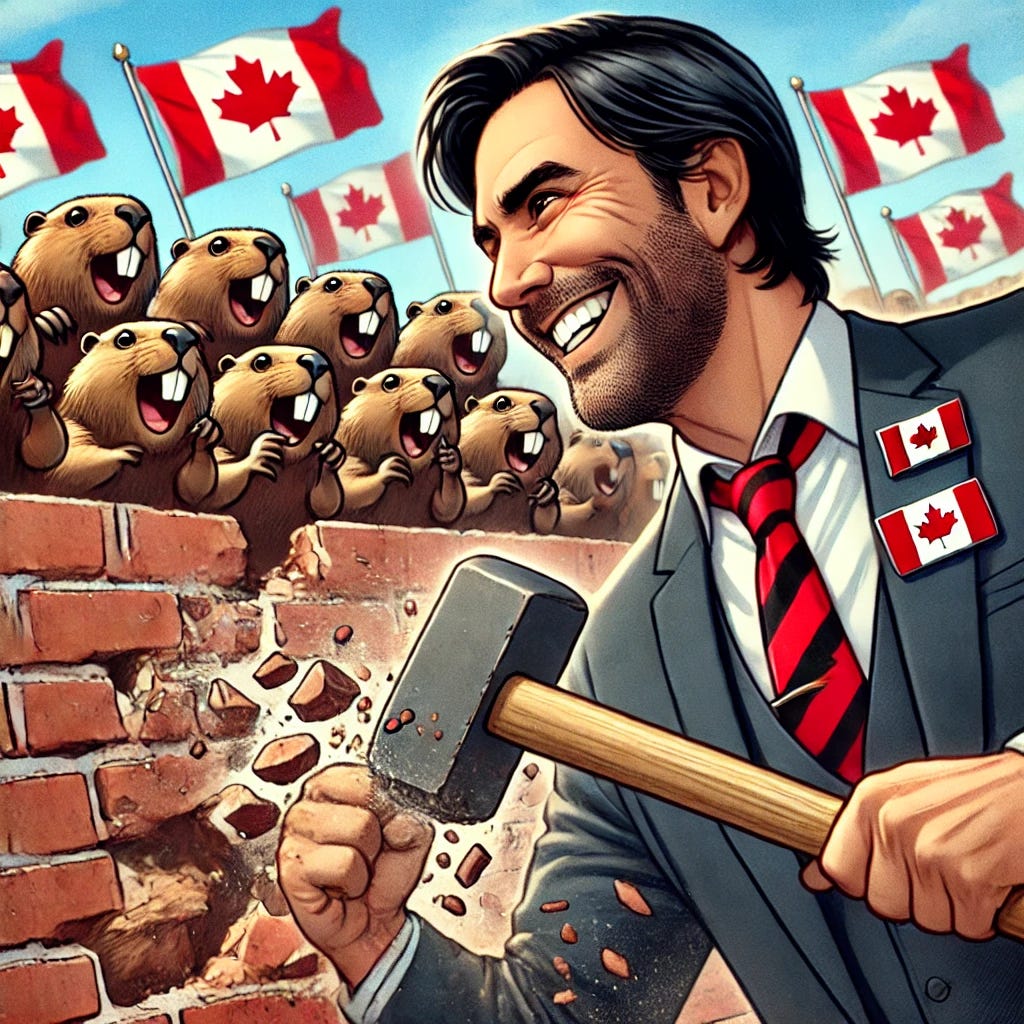

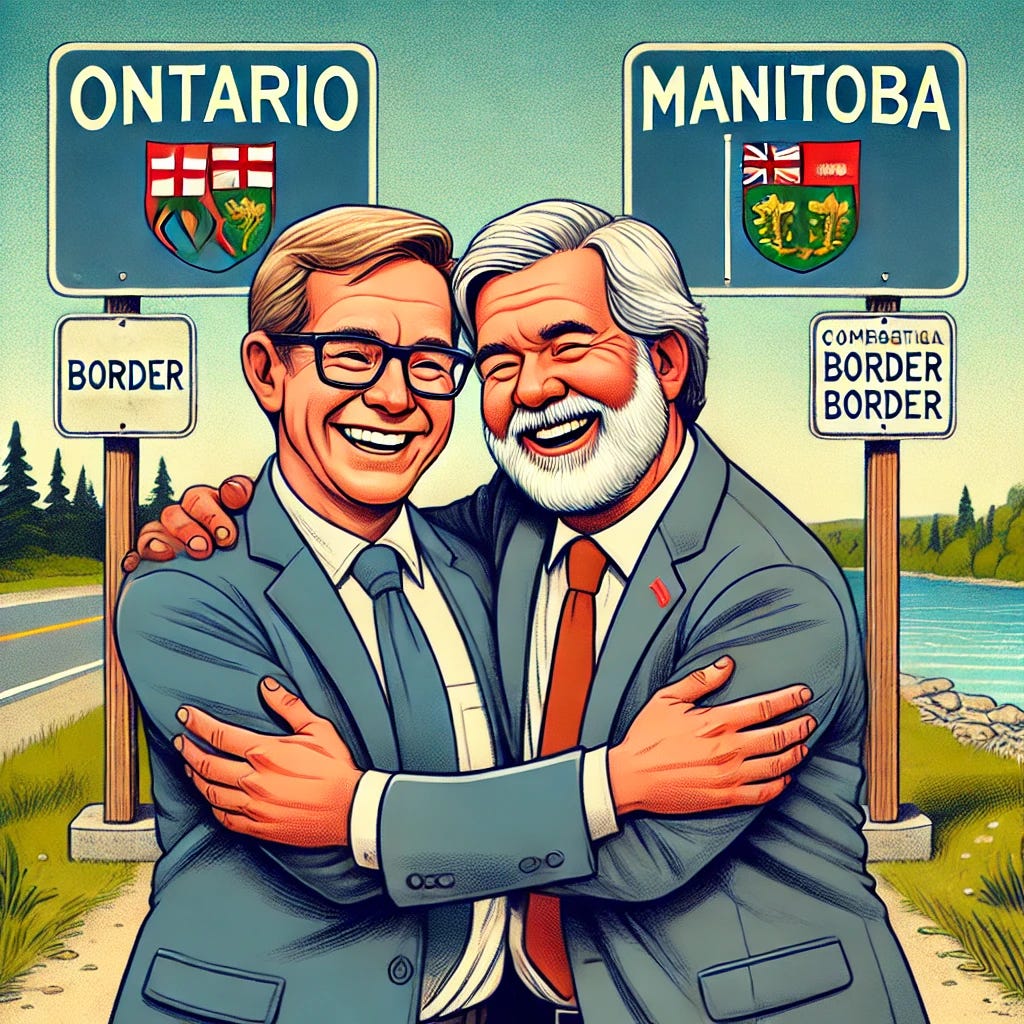

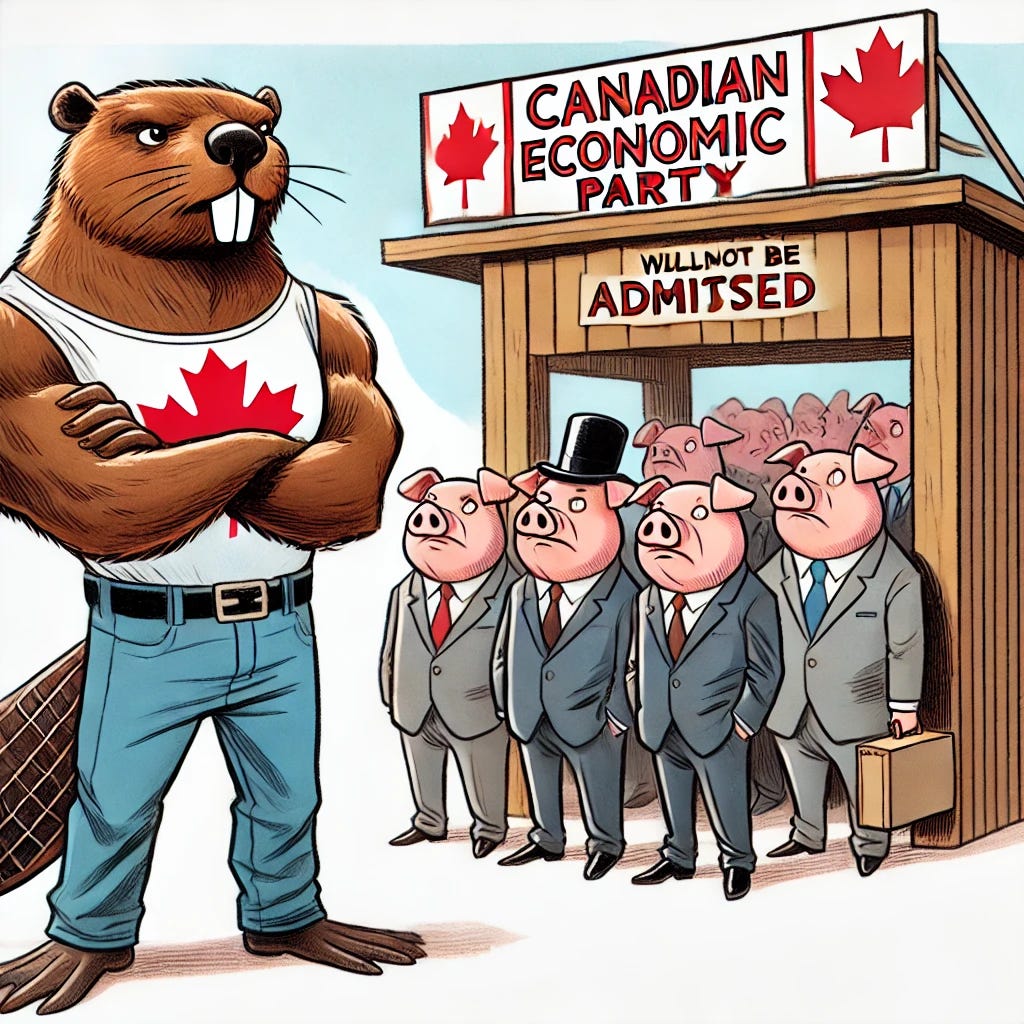



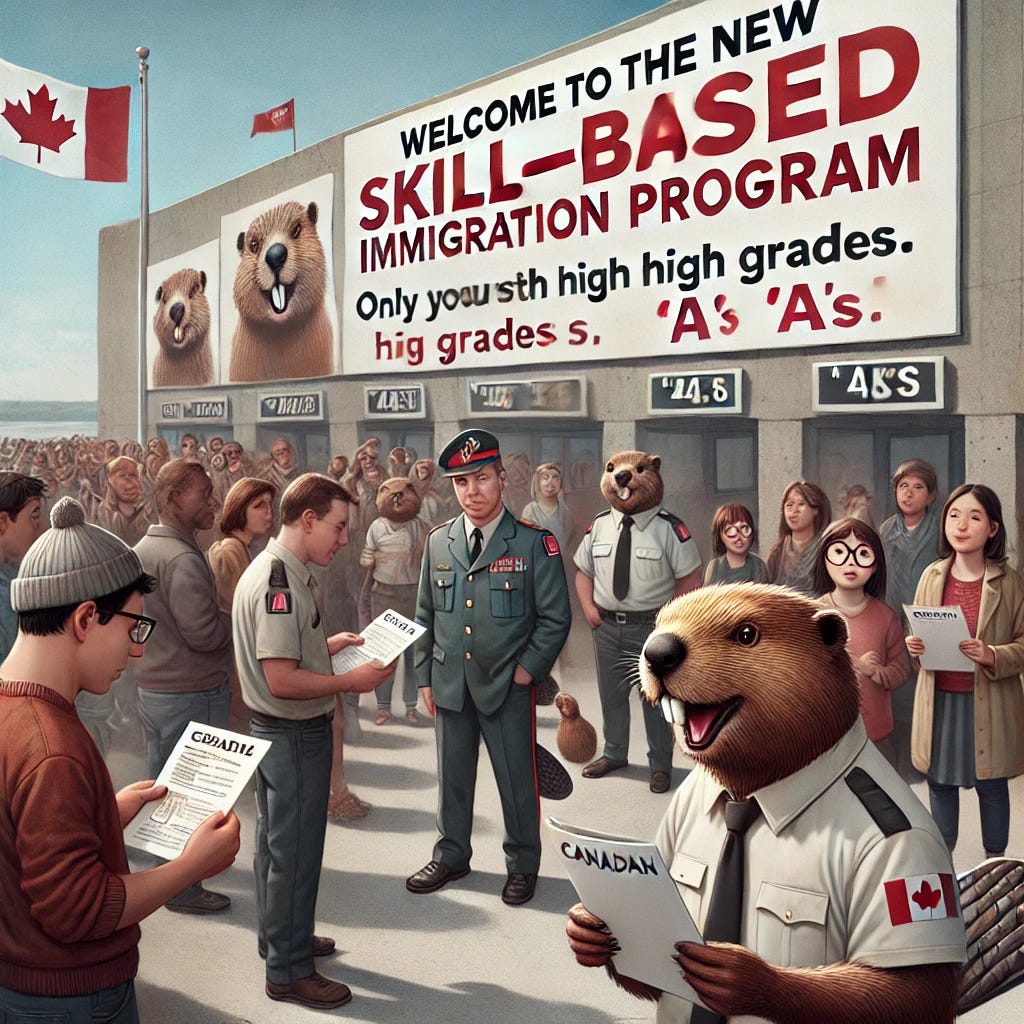

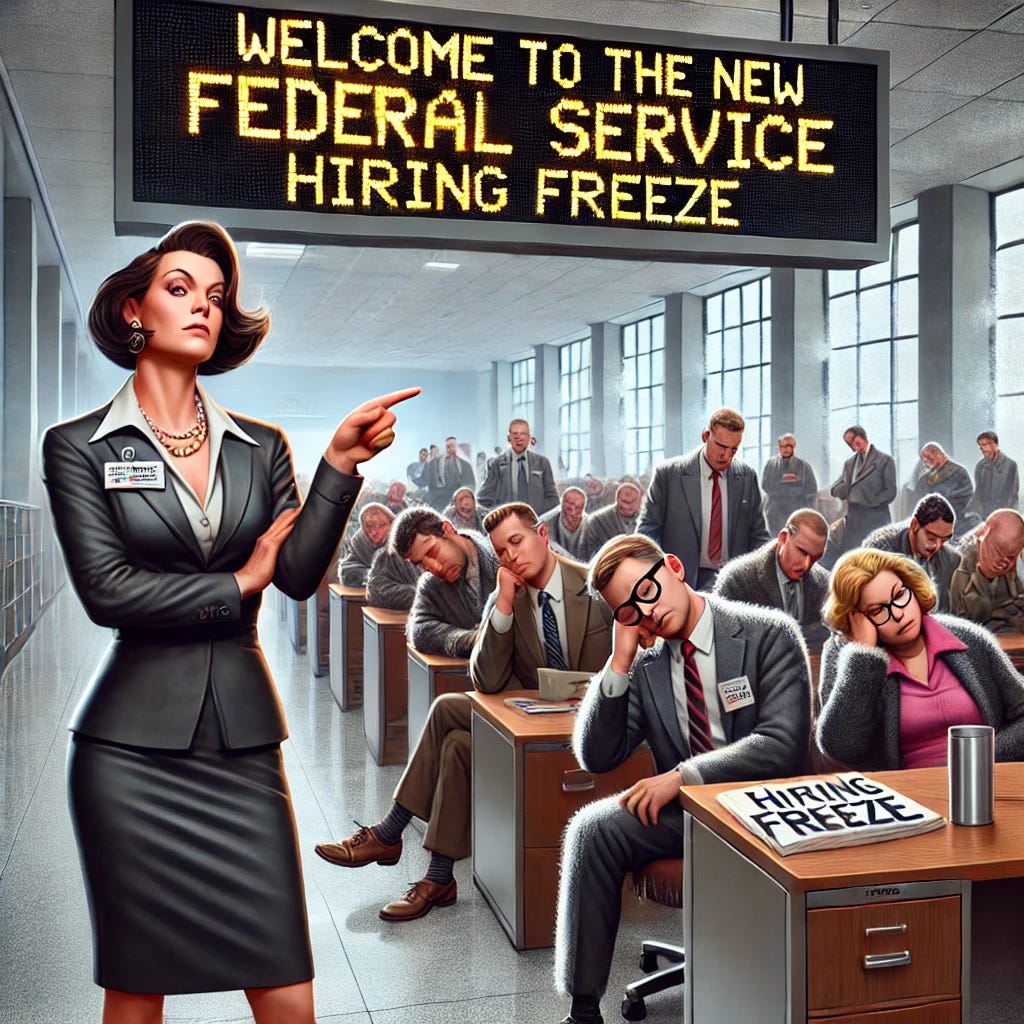



Separate point, in my lifetime I would say Brian Mulroney and free trade meets your criteria. The rhetoric against free trade was over the top, disaster was on our doorstep, but Mulroney, supported by an election win, marched forward and the country was better for it.
The best roadmap for the future I have read. Pragmatic and realistic, but as you state it takes a backbone to implement.